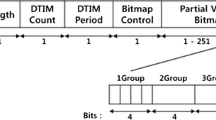Abstract
This paper presents experimental results for the actual effects of the IEEE 802.11 power saving mode (PSM) on communication performance and energy saving. First, we have measured the throughput and response time of a station working in PSM with various applications and compared them to those of the active mode. Energy consumptions have also been compared by analyzing trace data. Second, the effects of a PSM station to the neighbor stations have been investigated by measuring their performance changes. The experiments show that the amount of effects varies depending on application types due to traffic burstness and congestion control of underlying transport protocols. It may happen that a PSM station running a streaming application, somewhat abnormally, does harm to the performance of the neighbor station. Finally, a primitive solution against this abnormality is presented and experimented. This study could provide a good basis for further studies on utilizing PSM.
Preview
Unable to display preview. Download preview PDF.
Similar content being viewed by others
References
IEEE standard for Wireless LAN-Medium Access Control and Physical Layer Specification, 802.11 (November 1997)
Tseng, Y., Hsu, C., Hsieh, T.: Power-Saving Protocols for IEEE 802.11-Based Multi-Hop Ad Hoc Networks. Proceeding of IEEE Infocom 2002, 200–209 (2002)
Hsu, C., Sheu, J., Tseng, Y.: Minimize Waiting Time and Conserve Energy by Scheduling Transmissions in IEEE 802.11-based Ad Hoc Networks. Int’l Conf. on Telecommunications (2003)
Khacharoen, T., Phonphoem, A.: A Power SavingMechanism in Ad Hoc Network with Quality of Service Support. In: Proceeding of ICT 2003, pp. 119–124 (2003)
Chang, J., Tassiulas, L.: Energy Conserving Routing in Wireless Ad-hoc Networks. In: Proceddings of IEEE Infocom 2000, pp. 22–31 (2000)
Chen, B., Jamieson, K., Balakrishnan, H., Morris, R.: Span: An Energy-Efficient Coordination Algorithm for Topology Maintenance in Ad Hoc Wireless Network. ACM Wireless Networks Journal 8(5) (September 2002)
Xu, Y., Heidemann, J., Estrin, D.: Geography-informed Energy Conservation for Ad Hoc Routing. In: Proceeding of MobiCom 2001, pp. 70–84 (2001)
Zheng, R., Hou, J., Sha, L.: Performance Analysis of the IEEE 802.11 Power Saving Mode. In: Proceeding of CNDS 2004 (2004)
Krashisky, R., Balakrishnan, H.: Minimizing Energy for Wireless Web Access with Bounded Slowdown. In: Proceeding of MobiCom 2002, pp. 119–130 (2002)
Shih, E., Bahl, P., Sinclair, M.: Wake on Wireless: An Event Driven Energy Saving Strategy for Battery Operated Devices. In: Proceeding of MobiCom 2002, pp. 160–171 (2002)
Malinen, J.: Host AP driver for Intersil Prism2/2.5/3 and WPA Supplicant., http://hostap.epitest.fi
Author information
Authors and Affiliations
Editor information
Editors and Affiliations
Rights and permissions
Copyright information
© 2005 Springer-Verlag Berlin Heidelberg
About this paper
Cite this paper
Kwon, D.H., Kim, S.S., Park, C.Y., Jung, C.I. (2005). Experiments on the Energy Saving and Performance Effects of IEEE 802.11 Power Saving Mode (PSM). In: Kim, C. (eds) Information Networking. Convergence in Broadband and Mobile Networking. ICOIN 2005. Lecture Notes in Computer Science, vol 3391. Springer, Berlin, Heidelberg. https://doi.org/10.1007/978-3-540-30582-8_5
Download citation
DOI: https://doi.org/10.1007/978-3-540-30582-8_5
Publisher Name: Springer, Berlin, Heidelberg
Print ISBN: 978-3-540-24467-7
Online ISBN: 978-3-540-30582-8
eBook Packages: Computer ScienceComputer Science (R0)




